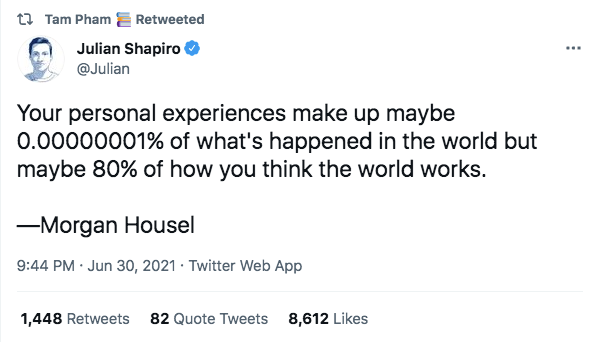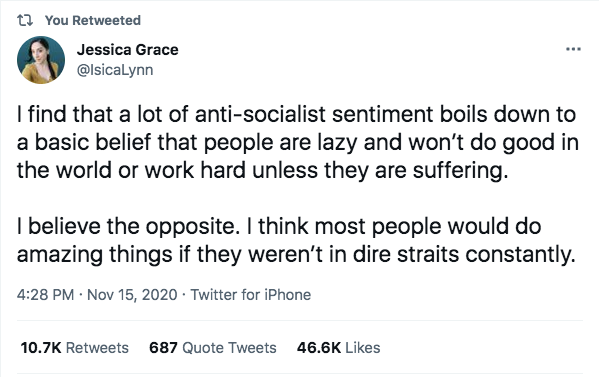💵 Tam's Jam: Psychology of Money, Laziness and Eviction (August 2021)
Heyo! The sun is out in Toronto.
I'm hugging friends again, taking dance classes, joining a softball league (first time), enrolling in Muay Thai classes (first time) and biking around the city.
After being isolated for so long it feels both amazing and wild to be doing "normal" things again.
I also got interviewed for a cool podcast called Backstage Careers. If you want to know how I apprenticed under startup founders and my career journey, you can find the interview here.
OK time for Tam's Jam. This issue features three books and a postscript on psychology, empathy and privilege.
—
💵 The Psychology of Money

I loved reading The Psychology of Money not just because it's about money but it focuses on WHY we spend.
We all come from different backgrounds and have different experiences. What might seem crazy for you might be perfectly “normal” for me.
The first chapter introduced why lower-income households spend $400 a year on lottery tickets.
Knowing that nearly half of Americans don't even have $400 of savings for emergencies, I wondered: Why do poor people spend money on lottery tickets?
The book explained how lottery ticket buyers don't see any other way towards building wealth and that this may be the only opportunity to get ahold of a huge amount of money. This article on Vox goes more in-depth about how the lottery preys on the poor.
People (like myself) with a higher income can get a new job. We can ask for a promotion or start a side hustle. We have more options.
If you are living in poverty, you may not have many options.
While I (and maybe you) may not agree with this logic, this book helped me understand WHY people might do what they do.
Reading each chapter gave me more insight and context to understanding human behavior. It makes me want to judge people less and seek to understand more.
The book will also spot your own blind spots and relationship with money which I found to be well worth the ROI on its own.
—
😴 Laziness Does Not Exist
I used to grow up believing that I should never give money to lazy homeless people. They are just going to use it to buy drugs and keep making bad choices.
But I never stopped to put myself in their shoes. What is it like to actually be homeless?
- It's cold and uncomfortable all the time
- You don't have a strong support network
- You don't get great sleep
- You don't eat much healthy food
- You have little access to medical care to deal with injuries or chronic pain
- The majority of homeless people are victims of trauma and abuse
- Many chronically unemployed adults have at least one mental illness
...and the list goes on. So wanting a drink or some cigarettes makes fucking sense.
When people (like my old self) judge them for "not trying hard enough", I never stopped to think about all of the unseen barriers they are facing.
When author and professor Devon Price notices a seeming "lazy" and underperforming student in his class, he discovers that they're facing massive personal struggles that include mental health issues, immense work stress, or the demands of caring for a sick child or elderly relative.
That student felt bad for missing assignments despite everything she was going through. So why do we view people as "lazy" when they are overwhelmed with what's on their plates?
The people we dismiss as "lazy" are often individuals who've been pushed to their absolute limits. Most human suffering is invisible to the outside observer.
So when we see somebody struggling, we assume they should just try harder. Manage your time better. Wake up earlier. But we are missing the point.
I've learned from this book that it’s really helpful to respond to a person’s behavior with curiosity rather than judgment
My favorite quote from this read:
"If a person’s behavior doesn’t make sense to you, it is because you are missing a part of their context."
People do not choose to fail or disappoint. No one wants to feel incapable, apathetic, or ineffective. If you look at a person’s action (or inaction) and see only laziness, you are missing key details. There is always an explanation. There are always barriers. Just because you can’t see them, or don’t view them as legitimate, doesn’t mean they’re not there. Look harder.
—
🏘 Evicted: Poverty and Profit in the American City
Sociologist and author Matthew Desmond follow eight families in Milwaukee as they each struggle to keep a roof over their heads.
These families are all low-income with the majority of their money (mostly welfare) going towards rent. Naturally, they don't always have the money to pay rent on time and get evicted.
The family doesn't have many options to find a new place in five days. They settle for a home that may not be properly up to code, located in an unsafe neighborhood under a strict landlord who wouldn't think twice about evicting them.
The sink or shower doesn't work properly. Cockroaches swarm the bed and kitchen. And many other problems that make life feel draining and hopeless.
They hesitate to get the Department of Neighborhood Services involved for substandard housing because the DNS will dispatch a building inspector who will issue orders to their landlord that will evict you for unpaid rent (or any legal reason they could find), leaving you to scramble to move their entire life again.
It's one thing to read statistics about low-income families and poverty. It's another to be invested in each families' story and a completely different view to actually live it...
It really grounds me to reality. That "change" for a lot of people is not something that can simply be done by reading a self-help book or "trying harder."
The issues are systemic. The day-to-day lifestyle can be soul-sucking. Being forced to move constantly always makes you feel unstable and oftentimes unsafe.
Having a stable household has never been something I have ever worried about for myself. It's something I definitely take for granted and never felt truly grateful for until reading stories like these.
This may not be the most joyful book but a topic that is rooted in reality and worth understanding.
—
📖 Postscript
I used to believe that I was special.
I had this hero story of myself being a kid who dropped out of college, worked hard to meet the right people and take the right jobs to build this amazing life for himself.
I judged other people hard when they struggled to be amazing like me.
- Why can't you drop out of college?
- Why don't you just start a business?
- Why can't you just learn whatever you want on YouTube?
- Why is everyone so lazy?
I feel quite embarrassed to even share my old thought process but this is the truth.
But let's consider my circumstances: upper middle class, grew up in Bay Area, good health, early access to technology, enrollment in after school, summer and tutoring programs, etc.
It's not that surprising that someone with this background will have a comfortable life as an adult without university.
So why do I want to believe that I'm some kind of hero?
Because my ego wants me to believe that I'm important. I want to believe that I took the path less traveled, excelled at whatever came to me and earned the opportunities I wanted.
While I did work hard and took risks, I'm not that special. I'm not that important. I'm not as resilient or heroic that I think that I am.
In plain terms, I'm just a normal dude who grew up in a good neighborhood and simply took a different path after high school. Got a job. Found some cool hobbies.
Had I grown up in a different zip code or had a chronic health condition or experienced a traumatic childhood, my life would have been completely different.
Looking back, I had friends growing up who couldn't pick them up from school because their parents didn't have a car. Or they had to be the unofficial parent for two of their younger siblings. Or they couldn't buy the custom sweaters that were offered to our middle school basketball team.
My compassion and empathy grew once I understood more context. How could I ever judge someone for being "lazy"?
Author Devon Price convinced me that laziness does not exist. Everyone can and wants to have a happy and healthy life. The playing field just isn't the same for everyone playing.

Tam Pham's Blog
I write about my adventures, learnings, and reflections on living my weird, unconventional life. Subscribe below!




